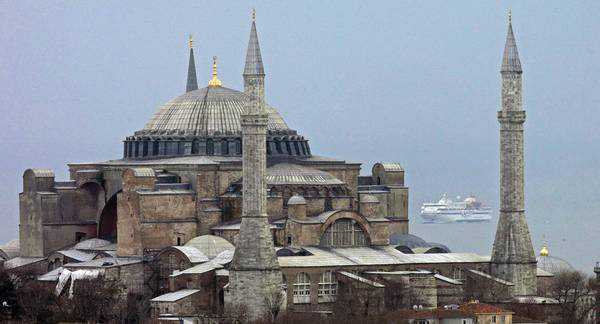The court action has gifted the Islamist parties with the popular underdog brand.
Since arriving in Ankara earlier this summer I have been having a cool Turkish dream. No, it does not take place on a yacht sailing through turquoise waters off the Turkish Riviera. Rather, my dream is a political one, involving Turkey’s ruling Justice and Development Party (AKP), in the wake of the Constitutional Court’s recent decision to fine it for violating the secular Constitution rather than shut it down. In my dream, the Islamist-rooted AKP embraces full-scale liberalism and finds a lasting balance between secularism and democracy for Turkey. My dream is not such a utopian one. Each time the Turkish court sanctions an Islamist party, that party reinvents itself as a more moderate political movement. In return, the court’s reaction to each reincarnated Islamist party has become less harsh. The court shut down the AKP’s hard-core Islamist predecessors, the Welfare and Virtue parties. But now it has come down with a lesser verdict against the more moderate AKP, hoping that the party will moderate further.
The AKP’s record gives me much hope it will do so. When the court shut down the Virtue Party in 2001 for its antisecular activities, the AKP emerged as a breath of fresh air. It publicly eschewed Islamism and pronounced respect for secular democracy, as well as the West and its liberal values. Then things got even better. After coming to power in 2002, the AKP promoted European Union (EU) accession for Turkey, driving a liberal reform agenda and following pro-business policies. The party reached out to different constituencies, suggesting a pluralist understanding of democracy and alleviating concerns about its Islamist pedigree. For a while, it looked as if the AKP had found a liberal balance between Islam and democracy and that it was moving Turkey west.
Alas, it was a mirage on three fronts. First, after Turkey started accession talks with the EU in 2005, the AKP’s appetite for the EU faded. It realized that accession talks meant costly reforms, and shied away from pursuing Turkey’s EU dream. What’s more, a November 2005 decision by the European Court of Human Rights to uphold Turkey’s ban on a specific Islamic-style headscarf (turban) on college campuses disappointed the AKP, which had come to believe it could rely on Europe to redefine Turkish secularism. Second, the AKP started to treat liberal, egalitarian democracy as an à la carte menu, choosing some liberties while ignoring others. For example, while the party pushed to lift Turkey’s turban ban on college campuses for female students, it implemented religion-infused policies that led to a decrease in women’s employment. The erosion of Western values under the AKP resurrected fears about the party’s Islamist pedigree, and Turkey was split down the middle between its supporters and opponents. Third, the AKP moved from a pluralist to a majoritarian understanding of democracy. After winning 47 percent of the vote in the July 2007 elections, the party started to interpret its popular mandate as a blank check to ignore democratic checks and balances, and harass dissenters in the media, NGOs, the courts and business groups. Within this background, the country’s secular chief prosecutor opened a court case against the party, asking the Constitutional Court to sanction the AKP for violating Turkey’s Constitution. Tension rose; some alarmist pundits even suggested that Turkey was moving into the abyss of democratic collapse through a “judicial coup.”
But such pundits have been proved wrong. The Turkish court’s August decision to put the AKP on probation demonstrated that democracy in Turkey is alive and kicking—and this is where my dream comes in. With the court’s decision, the karmic wheel of religion-based parties has made a full circle toward democracy in Turkey, leaving the AKP with a stark choice. The party can continue to spin the karmic wheel by adopting a sincerely pro-EU political platform and pushing for economic and social reforms in Turkey. It can also pursue full-menu liberalism with respect to Western values including pluralist democracy, secular politics and the right to dissent. And it can advocate true gender-equality policies. That would be my dream come true—a liberal, secular and democratic Turkey for all.
Or, the AKP might challenge the court and continue to bolster its later majoritarian tendencies. If court action against Islamist parties has moderated such parties, it has also made them more popular, pulling them to the political center, as well as gifting them with the popular underdog brand. Recep Tayyip Erdogan has already issued a rebuke to the court’s decision, and the AKP might go after a narrowly defined understanding of democracy, dismissing checks and balances and ignoring the real work of EU accession. In this mind-set, the AKP would further its vision of a religion-based society with the party’s distaste for women’s employment, alcohol consumption and secular education dividing Turkey in the middle. Such a development would inevitably bring harsh court action against the AKP, maybe even a ban. The karmic wheel of Turkey’s religion-based parties would stop spinning toward democracy, and that would be my nightmare.
Cagaptay is a senior fellow at the Washington Institute for Near East Policy and a visiting professor at Bahcesehir University in Istanbul.
© 2008
Source: Newsweek
